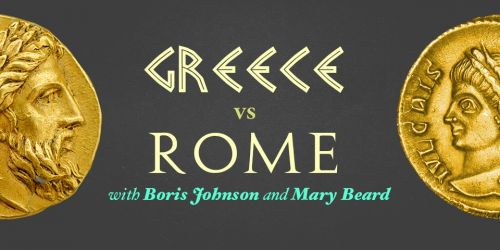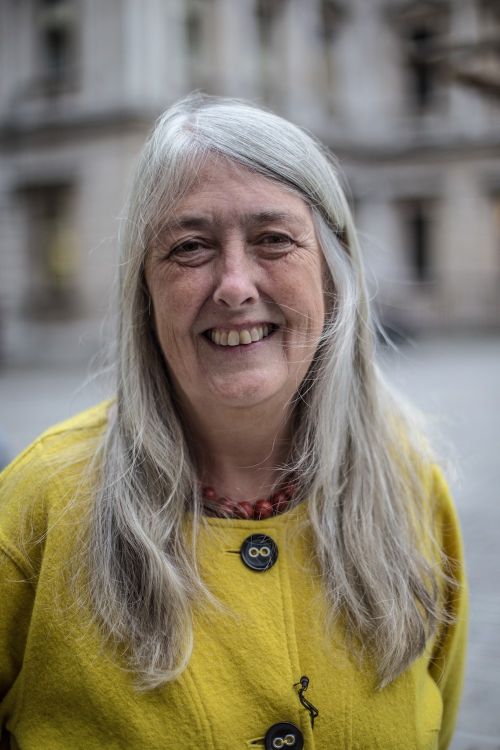On 19th November, a debate took place between Classics Professor Mary Beard, and the Mayor of London, Boris Johnson. The title of the debate was rather ambiguous: 'Greece vs Rome'.
The debate not only sold out – forcing its host, Intelligence Squared, to locate to the biggest venue in central London, Westminster’s Central Hall – but its high demand was recognised by Curzon Home Cinema, who filmed the event and are now enabling those who missed out to watch it from their homes. But why the abundance of public interest? Was it the opportunity to see a politician debate outside of the political arena? Is there an untapped, widespread fascination with Classics? Or do people simply want a closer look at Boris Johnson’s luminous hair?

To try to understand both what the question of 'Greece vs Rome' was really asking, and why there was such public interest in the debate, I spoke with the delightful Mary Beard the day before the event. Perhaps Britain's best known classicist, Mary has developed a public profile not only as a pre-eminent scholar but as Classics editor of the Times Literary Supplement, and for voicing her – at times controversial – political viewpoints.
To what extent is the underlying question of the debate, “which civilisation can we most relate to?”
You can always find wonderful things in the past and horrible things in the past, so I think the issue is not, as you say, what is “good” and “bad”, but what matters to us. In some way all civilisations have contributed to our deep history, but my claim is that there is more in Rome that makes up what we are than in ancient Greece.
In what way?
There’s a wonderful phrase by the Roman writer Tacitus, when he’s trying to imagine what the objections to Roman power are, and he says: “they make a desert and they call it peace.” I think there isn’t one of us, really, who can look over the last twenty years of Western interventions and not think “they make a desert and call it peace.”

How much can we say that the success of a civilisation is based upon the ability to conquer, rather than success as measured by the quality of the ideas it produces?
That’s always a big issue. Roman civilisation has got elements in it that have totally formed Western culture; Virgil’s great epic poem The Aeneid has been read by somebody every day since 19BC. You’ve also got the sense – in both the ancient and modern worlds – that alongside the soft power of culture is the brute force of boots on the ground. It’s not just whythey were successful, but what they thought of their success. What a lot of people don’t realise is that Romans were wondering about the way that conquest actually undermined the moral fibre of their race.
How important will the topic of politics be to the debate? And, seeing as you’re debating Boris Johnson, how much do you expect his own political background will shape his arguments?
I think politics is half the debate, but not all of it. You have to say: here we have two cultures which offer two versions. If we talk about ancient Athens, the slogan for at least 150 years was democracy; it was about people power. And that’s one of the slogans we’ve inherited. Whereas Romans would never claim to be democrats, but they talked about liberty: what “libertas” was and how you achieve the liberty of individual citizens. Those are two sides to our own sense of what our political system is. The Roman version is more topical because modern debates are about terrorism, stand-offs between the right of the individual citizen and homeland security. Rome looks at those issues head on and raised questions like: “is it right to execute a citizen in the interests of the state?”
So Rome is important because the people who will be sat in your audience tomorrow will want to engage with problems similar to those addressed by the Romans?
Now! Yes, now! The problems we face now! There is a lot of “now” about both the Greeks and Romans. But the Romans, they’re a big culture, they lived in a city of a million people, they had an empire of 50 or 60 million people – it's multivalent, it's polyglot, and it’s us in some way.
In a piece for the BBC last February you wrote about the lacklustre rhetoric used by many politicians. Do you think Boris Johnson will throw off his political rhetoric tomorrow and come out guns blazing?
[Laughs] I doubt it, but I hope so. He’s very funny, very witty. I don’t think Boris ever really throws off his political rhetoric.
Do you think he's the reason for the debate’s popularity?
It’s got to be Boris – it’s not me! If you got Boris talking about nuclear fusion, would you get an audience? I think you would. It goes along with people wanting to think about the past, that the ancient world gives us new and different ways of talking about the problems we want to face.
In that same BBC piece you referenced Nick Clegg’s phrase “alarm clock Britain”, and wrote: ‘most of us don’t wake up to an alarm clock anymore, just some preselected music’. On the morning of the debate, what song will be waking you up?
I think it’s got to be "Sisters Are Doin’ It For Themselves".
Intelligence Squared's Greece vs Rome event featuring Mary Beard is available to watch now on Curzon Home Cinema: http://www.curzonhomecinema.com/#!/film/CRZ_GREECE_VS_ROME

